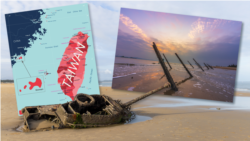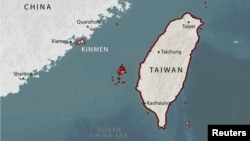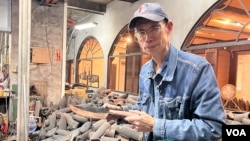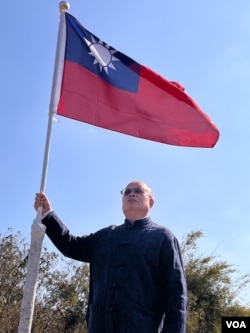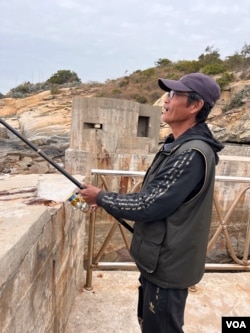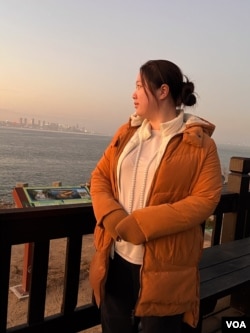From the Kinmen Islands, a Taiwanese outpost just three kilometers at its closest point from China, residents can stand on a beach and look across at the growing forest of skyscrapers in the Chinese city of Xiamen. But far from feeling threatened by their proximity to the country that vows to "reunify" with Taiwan — by force if necessary — most Kinmen residents say they feel safer on China's doorstep than they would on the main island of Taiwan.
That is not to say that Beijing has never threatened Kinmen. Also known as Quemoy, the islands bear the familiar scars of a former battlefield, including a tank that can still be seen half buried in the sand at low tide. These are the physical remnants of a front-line struggle between Communist China and democratic Taiwan that continues to this day.
An hour's flight southwest of Taipei, Kinmen's legacy as a geopolitical fault line stems from Mao Zedong's 1949 founding of Communist China, which drove Chiang Kai-shek and his Chinese Nationalist Party — also known as the Kuomintang (KMT) — to retreat to Taiwan.
Decades of artillery fire
Since that time, Kinmen has seen on-and-off exchanges of artillery fire, including 44 days of shelling that started on August 23,1958. The event has many names, including the 823 Artillery War and the 1958 Taiwan Straits Crisis. The communists and KMT eventually agreed to shell each other on alternate days, a pattern that ended only in 1979, when the U.S. switched diplomatic recognition from the government in Taiwan to that of Communist China.
The KMT, now the main opposition party in Taipei, is still favored by most Kinmen residents because of its support for closer ties with China. In contrast, many supporters of Taiwan's ruling Democratic Progressive Party, or DPP, favor distance from Communist China and identify themselves as Taiwanese. Kinmen residents' identity and views on their relationship with China are uniquely shaped by the island's history of war and proximity to China.
Wu Tseng-Dong: Knifesmith
Wu Tseng-Dong has half a century's worth of experience at making knives and kitchen tools. His grandfather was a blacksmith and the trade was passed down for generations in his family, residents on the island for more than 80 years. His brand, Maestro Wu, has several stores in Kinmen and is a regular stop for tourists, made famous for its knives made from artillery shells.
"The materials we use are mostly the artillery shells left behind from back in the day. We're making something useful out of waste," said Wu.
He was only seven months old during the 823 Artillery War, but he remembers growing up with shelling every other day. The shells provided plentiful raw material for kitchen tools at a time when many things were lacking on the island. He says one shell can be used to make 60 knives.
"Sometimes you'll find artillery shells when walking out in the fields. Sometimes when digging at a construction site, they'll dig up shells."
Many of the shells that he has used for his work once contained propaganda leaflets. As a child, Wu said, he was supposed to turn in any that he found to his teacher without reading the contents, but occasionally, he skimmed the leaflets.
"It said how beautiful the scenery is in mainland China, how life is good. It's pretty much the same as the leaflets we sent over there," Wu remembered.
While China no longer lobs artillery packed with propaganda leaflets at the islands, the message is the same.
In Chinese leader Xi Jinping's 2024 New Year's message, he said "China will surely be reunified, and all Chinese on both sides of the Taiwan Strait should be bound by a common sense of purpose and share in the glory of the rejuvenation of the Chinese nation."
Residents on Kinmen can see the Chinese coastal city of Xiamen from a Kinmen beach. At night, the dazzling lights of the Xiamen skyscrapers are a stark contrast to the island's small towns and rural landscape.
"We've kept watching China over these 30 years, we feel it is constantly reforming, and opening up. And in the last 20 years, I feel they have progressed the fastest," said Wu, describing the changes in traffic, economy and construction in Xiamen.
"China's cities and architecture are completely different from the way we used to imagine how China would be."
And while China has never revoked its threat to use force to unify Taiwan with the mainland if necessary, Wu said Kinmen residents do not fear an attack on the island.
"Having grown up in Kinmen, we're used to it. If we were afraid, we would have all fled to Taiwan during the 823 Artillery War," he said.
With reminders of past battles all around his forge, Wu hopes for peace and that the governments of China and Taiwan will adopt a gentle and peaceful approach toward each other.
Honor Ni: Retired Army Officer
Born in 1955, Kinmen native Honor Ni was 3 years old during the 823 Artillery War. He remembers the suddenness of the shelling, and that people who lived in the hills would dig holes in the ground to hide from the blasts.
"In the holes there was no airflow. There were smells of human waste. The air was bad. One day I couldn't stand it anymore, so ran out of the hole. My parents and relatives all left the hole to run after me," and that was when a shell hit the location where Ni and his relatives had been hiding. Ni said his action had saved the lives of his loved ones, but there were many casualties on the island. Ni's house was hit and collapsed.
Even after the crisis, the sound of artillery fire continued to be a part of life on Kinmen Island, where Communist and KMT forces shelled each other on alternate days for the next 20 years. At the time, military personnel outnumbered the local residents.
"Everyone really respected the military at a young age. I insisted that I wanted to test into military school. When schoolmates went from class to class to recruit to serve the country, meaning to reunify the country. The unification is not China reunifying with us. It's us, the government in Taiwan taking back China."
Ni served in the army and retired as colonel. He now teaches at the National Quemoy University. Ni identifies himself as Chinese.
"Because of geography, we are almost together. We're very close to each other. We have a similar way of thinking and affection toward China; ... Kinmen itself was one of the islands of China's Fujian province." He added, "We are all a part of one family. Since we are one family, it's impossible for anyone to break away."
Ni said most of the people on Kinmen want peace and unification between Taiwan and China, and for that reason, "if war breaks out between China and Taiwan, Kinmen will be the safest spot."
"I want to emphasize, when I say unification, I don't mean to Taiwan to be unified with Communist China. It would be them being unified with us."
Ni said the two sides should communicate based on the universal values of freedom, democracy and equality. "We can do it in 50 years or even 100 years, to talk about unification."
Ni said he expects economic and diplomatic pressure from China, but if Taiwan's government does not talk about independence, he believes China will not attack.
Ouyang Cheng-yi: Retired Bag Designer
Born on Kinmen Island, Ouyang Cheng-yi like many of the youth raised on the island, left for opportunities elsewhere. He worked in Taiwan as a bag and purse designer. He also lived in China for almost two years, sent by his company to work in a factory there. With an aging parent in poor health, Ouyang is back in Kinmen and retired.
To fight boredom, he spends three to four days a week fishing off the coast. VOA spoke to him while he was fishing on top of what used to be military tunnels that opened up to the ocean, where troops had lived. Places that were once off limits for civilians have been transformed into tourist attractions.
Ouyang remembers a very different Kinmen growing up when troops outnumbered locals on the island and the island was under martial law. There were curfews and lights could not be turned on at night to prevent Communist forces from seeing a target. His family owned a small eatery near his home and business was good.
"We lived in a traditional home with three buildings surrounding a courtyard. At night, it would be packed" because what happened within the compound could not be seen from the outside.
Unlike most of Kinmen's residents who support the KMT, Ouyang voted for the winning DPP presidential candidate, Lai Ching-te, who served as Taiwan's vice president for the past eight years. Ouyang said DPP President Tsai Ing-en has done a good job during her two terms in office.
Many DPP supporters like Tsai's efforts to build closer ties with like-minded democracies globally. They hope Lai will continue to do the same.
"He's more reliable and also more trustworthy." Ouyang said. "He didn't just get to the top automatically. He came up through experience."
Ouyang identifies himself as Kinmenese and says natives on the island, unlike their counterparts in Taiwan, do not fear China because of what they have experienced in the past. He said the current tensions and the threat of China attacking are just talk.
"If they wanted to attack, they would have attacked us already. Kinmen isn't afraid of China attacking us," he said.
Wu Ching-hsuan: University Student
University student, Wu Ching-hsuan has lived in Kinmen for almost three years. Going to school on the island has also allowed her to visit the Chinese coastal city of Xiamen often. It's only a 30-minute ferry ride away. Wu and her friends had just returned from Xiamen when she spoke with VOA and described her impressions of the Chinese city.
"Even for a small city, the government can do a good job on the most basic construction projects, so I feel China has contributed to its own city and citizens," Wu said as she looked across the water at high rise buildings in Xiamen.
Kinmen has not experienced the same kind of economic development. Old traditional homes from the Fujian province in southeastern China can still be found on the island. Some have been renovated while others have not. Bullet holes can still be seen on the walls of some buildings. Reminders are everywhere of Kinmen's past as a battlefield between Communist forces and the KMT.
For Wu, it is striking how little Kinmen has modernized when compared to Xiamen. That is one of the reasons why many young residents eventually leave the island.
"There are fewer young people because the job opportunities and standard of living here aren't as good as in the city, so young people would go to bigger cities to look for work," explained Wu.
Many Kinmen residents have been in favor of a bridge connecting Xiamen to their island as a symbol of peace, to boost the economy and strengthen ties. But Taipei and the DPP government have said the bridge would pose national security risks. Many Kinmen residents, including Wu, disagree.
"Kinmen's citizens are not worried about the safety issue at all because our roots come from over there. No one will harm their own siblings."




